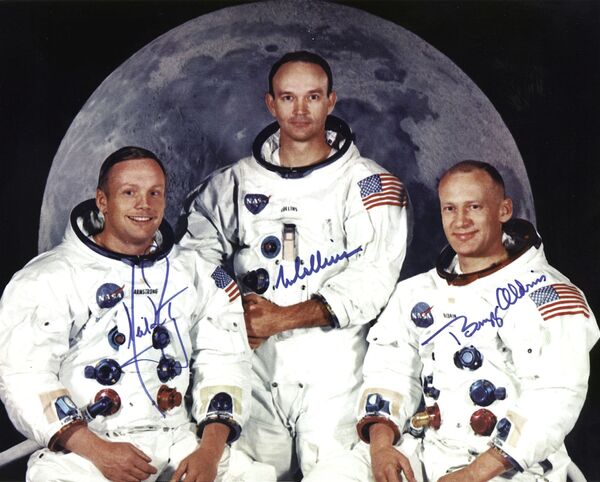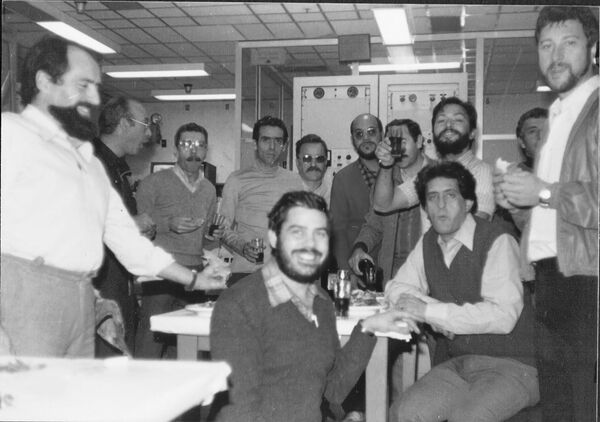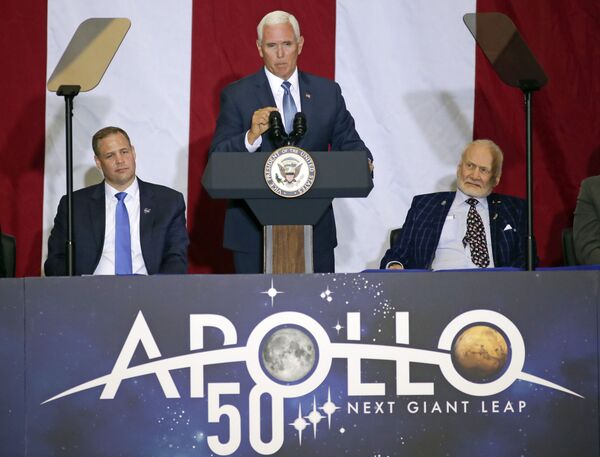Veteran astronaut Michael Collins may have shed light on the possibility of encountering alien life in space, as he recently tweeted about “life forms” on other planets.
The NASA astronaut, who orbited the Moon during the Apollo 11 mission in 1969 while his crewmates, Neil Armstrong and Buzz Aldrin, made the first crewed landing on the surface, was having a Twitter exchange with his more than 62,500 followers on 4 December, under the hashtag #AskMichaelCollins.
At one point he was asked by a fan if he considers seeking alien life beyond Earth or finding a habitable plane to settle as more important.
The NASA astronaut ventured the opinion that both options are intertwined with one another, tweeting:
“I think of it all as Outward Bound, a journey that may reveal both life and place. Ultimately, a place to live may be the final goal but may be dependent upon the life forms found there. I just hope we never have to make the decision to leave this Earth.”
I think of it all as Outward Bound, a journey that may reveal both life and place. Ultimately, a place to live may be the final goal but may be dependent upon the life forms found there. I just hope we never have to make the decision to leave this Earth. #AskMichaelCollins pic.twitter.com/Lrk29FRW7Q
— Michael Collins (@AstroMCollins) December 4, 2019
The tweet itself and the astronaut’s hint at “life forms” sent Twitter abuzz, with users swooping in to comment.
Finding other signs of life will or should be easier as we don't have to leave Earth. The question of whether we can ever develop the ability to travel the distances to other solar systems is harder to answer.
— Mark Johnstone (@radiationgloves) December 4, 2019
I don't think physics will let us settle other celestial bodies. But finding life away from Earth would be the most significant moment in human history. We'd know for sure that life forms independently more than once, hence that the Universe is full of it; that we are not- alone.
— Kai Noeske (@kainoeske) December 4, 2019
You don't think we'll be Cowboy Beboping it up on Ganymede in like, 200 years? ;P pic.twitter.com/tqGhGUHSxz
— Who Needs A Festive Name? (@WhoNeedsAName7) December 4, 2019
Many netizens shared their fascination with the likelihood of “finding life in other places of our universe”.
Good question. Through exploration and innovation we will seek habitation that is independent of Earth; mining and other offworld activities are very lucrative. However finding life in other places of our universe would be a monumental discovery and would change society
— Marco Thompson (@Marconius_Rex) December 4, 2019
Some took the opportunity to emphasise how important it is to safeguard our planet Earth instead of thinking humanity could simply abandon it after it ceases to sustain life.
Mr. Collins. The main mistake that is being introduced into the minds is that you can shit on the Earth and fly somewhere to a new place. Space is dead (you know it like no one else), the Earth is beautiful, it is our only home.
— SlawaProkopenko (@ProkopenkoSlawa) December 5, 2019
« Earth is the cradle of humanity but one cannot live in a cradle forever » Konstantinos Tsiolkovsky
— JPB (@JPB53556534) December 4, 2019
Other social media fans contemplated the likelihood of mankind ever leaving planet Earth.
I think that it is inevitable that mankind will decide to leave Earth. Apollo 11 paved the first bricks in the road which leads to the stars.
— GoneToPlaid (@GoneToPlaid) December 5, 2019
I want a retirement villa in mars. I hope I can save enough for it. Call it Galt’s Gulch in mars. Or Luna city in the moon.
— Miguel Urrutia (@MiguelUrrutiaR) December 5, 2019
Michael Collins is an American former astronaut who flew the Apollo 11 command module Columbia around the Moon in 1969 while his crewmates, Neil Armstrong and Buzz Aldrin, made the first crewed landing on the surface.

Timed for the 50th anniversary of man's first landing on the moon, Michael Collins's autobiography "Carrying The Fire" was re-released this year, after being originally published in 1976.

In it Collins recalls his early days as an Air Force test pilot, his training at NASA, and his experiences in orbit, including the Apollo 11 mission, the first manned lunar landing.

The final chapter in his autobiography has been lauded as a convincing argument in favour of mankind's continued endeavours to explore the Universe.


